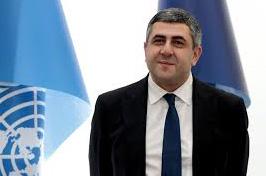
3 minute read
INTERNATIONAL TOURISTS ARRIVAL COULD FALL BY 30% PLUS
INTERNATIONAL TOURIST ARRIVALS
COULD FALL BY 30% IN 2020 Tourism is among the hardest hit of all economic sectors. However, tourism is also united in helping to address this immense health emergency.
Advertisement
The unparalleled introduction of travel restrictions across the world, the United Nations specialized agency for tourism expects that international tourist arrivals will be down by 20% to 30% in 2020 when compared with 2019 figures.
UNWTO stresses that these numbers are based on the latest developments as the global community faces up to an unprecedented social and economic challenge and should be interpreted with caution in view of the extreme uncertain nature of the current crisis.
An expected fall of between 20- 30% could translate into a decline in international tourism receipts (exports) of between US$300-450 billion, almost one third of the US$ 1.5 trillion generated in 2019. Taking into account past market trends, this would mean that between five and seven years’ worth of growth will be lost to COVID-19. Putting this into context, UNWTO notes that in 2009, on the back of the global economic crisis, international tourist arrivals declined by 4%, while the SARS outbreak led to a decline of just 0.4% in 2003.
UNWTO Secretary-General Zurab Pololikashvili said: “Tourism is among the hardest hit of all economic sectors. However, tourism is also united in helping to address this immense health emergency – our first and utmost priority – while working together to mitigate the impact of the crisis, particularly on employment, and to support the wider recovery efforts through providing jobs and driving economic welfare worldwide.” Mitigating damage and planning for recovery
Mr. Pololikashvili added that, while it is too early to make a full assessment of the likely impact of COVID-19 on tourism, it is clear that millions of jobs within the sector are at risk of being lost. Around 80% of all tourism businesses are small-andmedium-sized enterprises (SMEs), and the sector has been leading the way in providing employment and other opportunities for women, youth and rural communities.
Alongside this new assessment,
UNWTO underlines tourism’s historic resilience and capacity to create jobs after crisis situations, while also emphasizing the importance of international cooperation and of ensuring the sector is made a central part of recovery efforts.
Since the start of the current crisis, UNWTO has been working closely with the wider United Nations system, including directly alongside the World Health Organization (WHO) to guide the sector, issuing key recommendations for both high-level leaders and individual tourists. To better consolidate and strengthen the response, the Organization has established the Global Tourism Crisis Committee.
WE HAVE TO WAKE UP QUICKLY
Mr.Zurab Pololikashvili, Secretary-General ,UNWTO urged the partners in the European Commission, across the United Nations and the Bretton Woods institutions to embrace tourism like never before.
The Spring Meetings of the World Bank and International Monetary Fund set the backdrop for global leaders to advance immediate response and the economic policies to chart a path towards a sustainable recovery. The meetings follow decisions made by the European Union and national governments across the world.
The message reads that Tourism must be recognized as a key pillar for building a better future in all world regions and past recoveries prove that the importance of tourism sector cannot be overstated. In Europe, the world’s leading tourism destination, the sector generated last year more than US$407 billion in international tourism receipts, providing more than 27 million jobs. And jobs are a lifeline for communities, including the most vulnerable members of society which will ensure that tourism grows back stronger and better – but only if it has the right support from the highest levels of government and international organizations.
Zurab Pololikashvili urged to wake up quickly to start concrete action is of the essence to face up the shared challenge.











